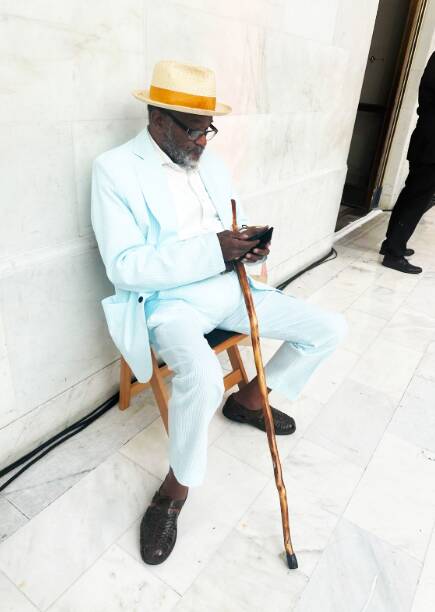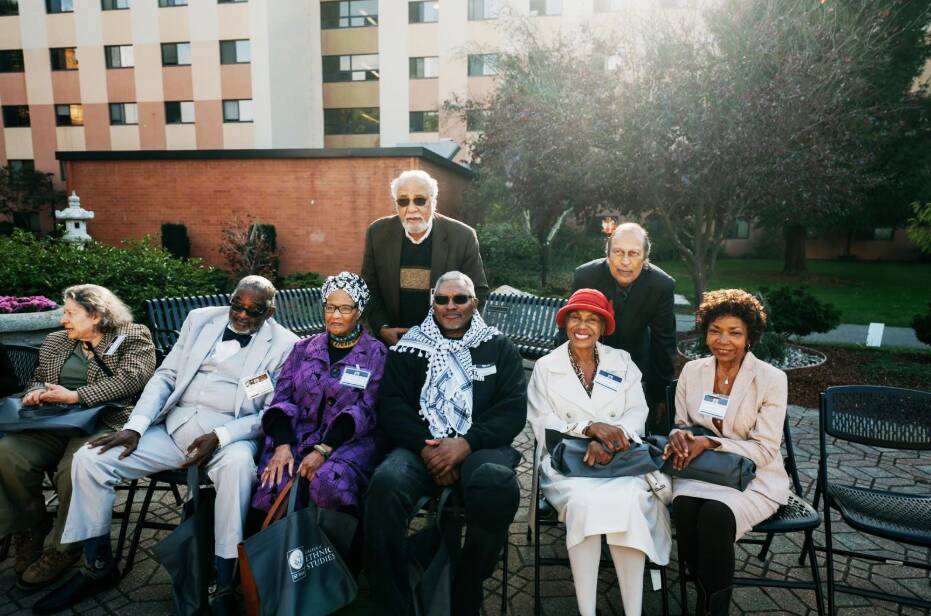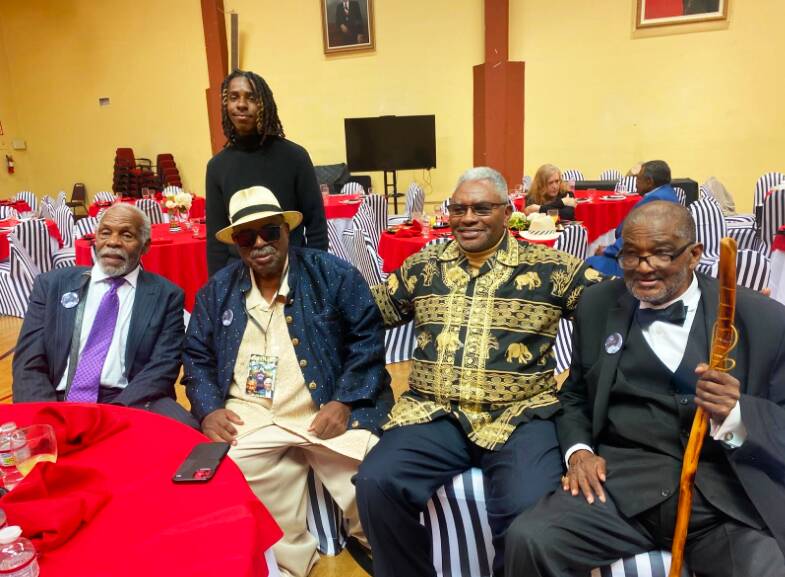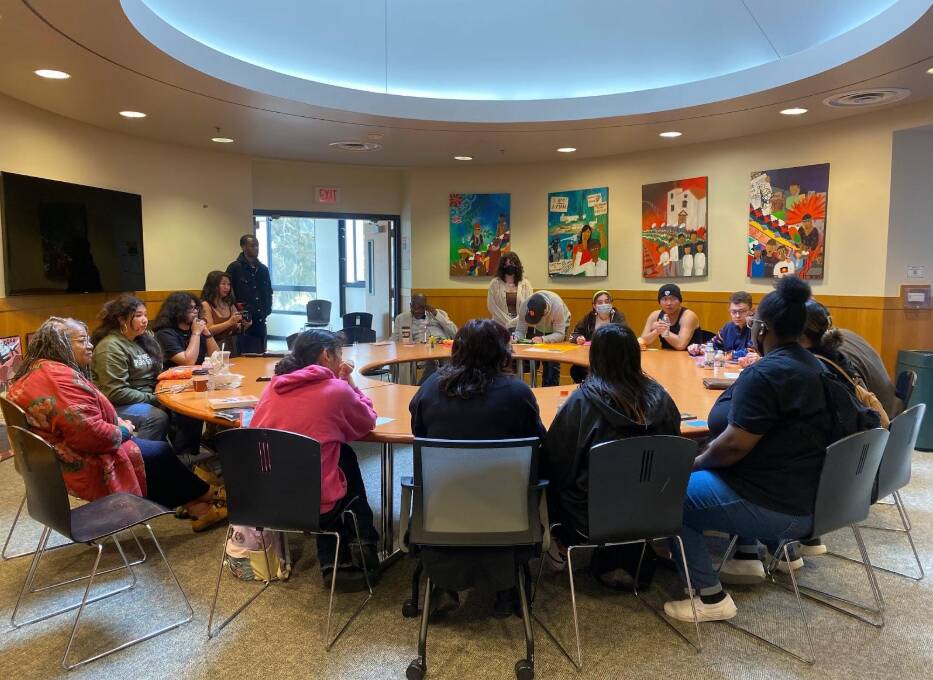
by Dr. Tiffany Caesar
The Black Student Union recruits for SFSU
“The Fillmore was live!” Rev. Arnold Townsend shared in the “Voices of Truth to Power” oral history interview he did at San Francisco State University. He remembered the Black entrepreneurship flourishing while he was a student at SFSU and working graveyard shifts at the local post office. With a glimmer in his eye, he named places like Booker T, the Birdcage, Minnie’s Can-Do Club, and Nate Thurmond’s restaurant that added to the Fillmore Black culture.
However, before Fillmore became his eternal home, Townsend highlights his early years of growing up in Oklahoma in a small Black town and then moving to Watts in LA. His family was the first Black family in the then “Leave It to Beaver” neighborhood of LA. He had dreams to become a famous baseball player, and had discussions with the White Sox and the Phillies before he was drafted to the army. After the war, he came to the Bay.
Townsend called Fillmore “The Harlem of the West.” He was introduced to the bustling neighborhood by members of the Black Student Union at SFSU. The newly returned Vietnam War veteran was recruited to attend SFSU by the Black Student Union Central Committee members George Colbert and Wade “Speedy” Woods, who visited him frequently in front of the Both/And Jazz Club to buy a joint. His new affiliation with the BSU would introduce him to a campus that was ripe for liberation as they fought for inclusion and diversity.
However, he already envisioned going to SFSU after the war because he was a reader of their literary magazine, Open Process. His friend George from war left his post early and attended SFSU, so he sent him the magazine while he was still stationed. Towsend looks back:
“And so he sends one copy of Open Process. It had a full frontal nude of a woman, and I decided right then, this is probably where I want to go to school.”
Townsend was 23, he reminded the interviewers. He was a returning veteran in California, entering another war on campus known as the 1968 Black Student Union-Third World Liberation Front Student Strike at San Francisco State University.

“I went to jail three times” during his participation, he attests. Rev. Arnold Townsend said he was a “soldier” in the Black Student Union during the strike. He stood on the front line fighting the police and advocating for much needed change, similar to Dr. Ramona Tascoe who was the first student arrested in the students’ opposition to the university.
Townsend, the young liberator, was amongst a group of students in the strike who did not graduate, like Roger Alvarado. Yet, their roles and sacrifices can not be overlooked in the cultivation of the first Black Studies Department, the first College of Ethnic Studies, and creation of many social justice institutions and initiatives in the Bay Area and globally.
In joining a cadre of students advocating for change, he asserts, “I believe that when people of a certain kind of intelligence find themselves in the same place together at the same time, major things happen” – like the 1968 San Francisco State Student Strike.
Building purpose
While he was a BSU member, he taught Black History summer school in South Park and the Fillmore. He recalls, “Fifty something years ago, I taught a summer school class in the Fillmore, and I ain’t been able to get out of the Fillmore since.” Author and student striker, Judy Juanita also confirms the students creating various programs in Bay Area neighborhoods.
After his time at SFSU, Rev. Arnold Townsend worked in Bayview Hunters Point on various social justice initiatives that advanced the lives of underrepresented and underresourced communities. He joined a collective to create a non-profit organization titled Without Walls Community Development Corp. The title included the name of his church. In thinking of the organization, he mentioned, “We’ve always felt that people put up too many walls, when they ought to be building more bridges between each other.”
The mission of the nonprofit included the development of “affordable housing and to provide housing-related community support services for families in the Western Addition and Fillmore neighborhoods in San Francisco, the most underserved and underinvested communities in the city.” Rev. Arnold Townsend’s participation in the Black Student Union instilled in him a passion to serve his community with an unstoppable vigor. He amplifies that it was the community that helped him when he was student fighting for liberation at San Francisco State University,

“And you also got to understand that these were the people who kept the strike going. They not only came out and walked the picket line. Community icons – people like Mary Helen Rogers – they walked the picket line, they also fed us. I mean in their homes, they fed us, they took care of us, they protected us.”
Student soldiers
He was not the only one who built social justice institutions in the Fillmore after participating in the strike. He shares that KPOO radio station was the most significant institution that emerged afterwards. Joe Rudolph, participant in the strike and a veteran like Townsend, went back to the Fillmore after his participation and contributed to creating a community-based media center. These seeds would lead to the development of KPOO, which was the first radio station to play rap music and consistently provide social justice commentary. Rev. Arnold Townsend shared that he and others fought in the strike to “improve, build up, rescue, and save our communities.”
Following the strike, San Francisco State University had open enrollment, and one of the most prominent Black psychologists went to school: Dr. W. Gene Mabry from Bayview Hunters Point. Townsend continued to advocate that community hours should be non-negotiable in the current curriculum versus an ivory tower model that separates, creating unproductive hierarchies.
He affirms that a college education “wasn’t just for some intellectual pursuit; it was to save people’s lives.” In addition, students were supposed to help in building the community and come back as he and Gene did.
The man
Rev. Arnold Townsend’s aura of love, joy, political activism towards Black upliftment, encouragement to all and kindness still permeates the Bay today. You can feel his presence in the coffee shops where he chopped it up with local folks or admire his passion for the preservation of Black culture in the African American Art and Culture Complex, where there is a beautiful wall painting of his essence.
Townsend sat on many boards concerning the advancement of Black people in the Bay Area. Former Mayor London Breed even proclaimed Arnold Townsend’s Day in San Francisco on his 80th birthday in May 2023. This will be the first year the Bay celebrates his legacy without hearing his hearty laugh since his recent passing in October 2024. Former Mayor London Breed shared on an Instagram post following his departure:
“Today, we remember Rev. Arnold Townsend, a pillar of strength, guidance, and wisdom in our community … Rev. Townsend was more than a leader, he was a friend and mentor to many, and his legacy lives on in the countless lives he touched. His unwavering dedication to justice and equality shaped our city’s journey, and I am profoundly grateful for his friendship and guidance. He will truly be missed, but his impact remains as a beacon for us all. Rest in power, Rev. Townsend.”
The richest man in the Bay with the golden mission of service to his community is far from forgotten.

Rev. Arnold Towsend’s Golden Mission
An SFSU student asked him, “How do you keep the fight going?” Rev. Arnold Townsend responded with a few things like pushing policy, creating literature and building community institutions. He shared, “The work is never done.” This was truly amplified in his life through his dedication to justice and equality.
I fondly remember Rev. Arnold Townsend coming to San Francisco State University to support various initiatives surrounding the preservation of the Black Student Union and their creation of the 1968 SFSU Student Strike. He always talked to students.
His Golden Mission included passing on a legacy of liberation by continued advocacy for resources for people in need. Some of the students shared the following comments when he came to my Black Lives Matter: Race and Social Movement course to speak a couple of years ago:
“I love what you said about the community protecting the students of the strike. Your story was moving and inspirational. Thank you for sharing.”
“I could talk to Rev. Townsend all day.”
“Thank you for speaking today and enlightening us with your life stories and advice…. I take a lot from this and hope to spread this information to others who hope to be the voice. Thank you as well for creating a change and being a voice, while spreading love.”
“I am happy that he reminded us, if you want to fight against injustice, you have to be uncomfortable.”
Lastly, Amylah Charles, the Black Student Union external president and director of Associated Students Art Gallery, shared on May 13 in Jack Adam’s Hall that the Rev. Arnold Townsend Luminary Award will be given to his family. It was an award she helped to create due to her mentorship with Townsend. She mentioned that each year it will be awarded to a student or community member who partakes in leadership and community engagement. The SFSU Broadcast and Electronic Communication Arts (BECA) Major and Africana Studies Minor is carrying on Rev. Arnold Townsend’s service.
Rev. Arnold Townsend has inspired and impacted many. We are continuously reminded of the need to serve our community and advocate for positive change by magnifying his Golden Mission.
Notes: You can find the full oral history interview with Rev. Townsend in the San Francisco State University Library online digital collection under “Voices of Truth to Power: The 1968-69 San Francisco State College Student Strike Oral History Archive of the BSU, TWLF and Collective Community.” Dr. Tiffany Caesar has worked on this oral history archive for the last three years with a collective of faculty and students from the College of Ethnic Studies at SFSU. She was one of the primary interviewers for Rev. Arnold Townsend, along with Grace Yoo, current dean of the College of Ethnic Studies. The interview was transcribed by SFSU student Charlene Oliver with Dr. Chrissy Lau’s guidance. The interview was recorded by former SFSU student Yoko Tomada.
Dr. Tiffany Caesar is an Oakland-based writer, scholar, artist and activist. Her work emphasizes the preservation of Black cultural heritage institutions, Africana women and leadership, pan-African political movements, reparations and self-care. She is currently an assistant professor of Africana Studies at San Francisco State University, where she teaches African American History and Black Lives Matter: Race and Social Justice Movements. Dr. Caesar also serves as the SF Bay View Student Internship Coordinator. She can be reached at drcaesar@sfbayview.com.




